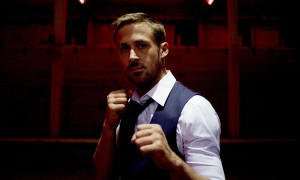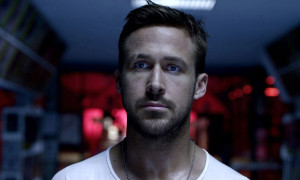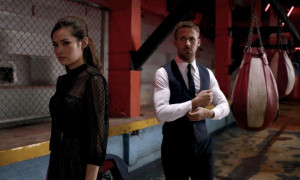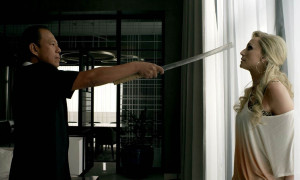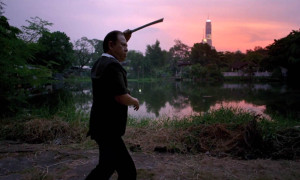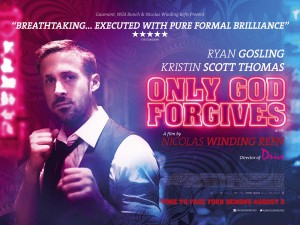 Director: Nicolas Winding Refn
Director: Nicolas Winding Refn
Cast: Ryan Gosling, Kristin Scott-Thomas, Vithaya Pansringarm, Tom Burke
Cert: 18
Running time: 90mins
Year: 2013

The lowdown: Danish devil Nicolas Winding Refn follows-up crossover hit Drive with a handbrake turn into an even darker alley. A perverse crawl over particularly jagged philosophical broken glass, the director’s reunion with Ryan Gosling is a hoary old revenge story soaked in graphically Old Testament style justice, refracted through the most gorgeous visuals you’re likely to see this year. Touched by the madness of David Lynch, the detached solemnity of Stanley Kubrick and the vengeance thirst of Park Chan-wook, this is not one to miss. Even if some audiences won’t be as forgiving as the man upstairs.
The full verdict: It is as if director Refn and star Gosling are in a contrary contest. After the success of Drive Refn had Hollywood placing him on speed dial, but he resisted the urge to become a quirky choice on a studio franchise.
And star Gosling reteams with the director who transformed him into a modern day Steve McQueen, only to play a character with scant charisma or fighting smarts of his Drive character.
Not for nothing is the movie dedicated to barnpot El Topo creator Alejandro Jodorowsky. Only God Forgives is tinged with that same uncompromising psychedelic weirdness.
Gosling is Julian, a US ex-pat running drugs in Bangkok with his unhinged brother Billy (Burke). When Billy is murdered after killing a 16 year old prostitute, Julian is ordered to kill all involved by his cracked mother Crystal (Scott-Thomas). But, this attracts the attention of lethally righteous policeman Chang (Pansringarm).
On this slender frame is hung a cosmically intense story of nothing less than the universe righting itself after a terrible misdeed. Some will boo the fractured, opaque structure as empty posturing (as happened at Cannes 2013.). Others will thrill to one man’s journey into a moral maelstrom, designed and executed with Kubrickian brilliance.
Reactions depend largely upon how willing you are to succumb to Refn’s carefully sustained atmosphere and engage with the clues he weaves into the fragmented story (assuming you accept everything is really happening).
Gosling plays his role blank and near silent, but uses those soulful eyes to convey guilt and anguish at the sins of his brother and the rage of his mother. Vanity free, he allows those good looks to receive quite the pasting and is maladroit in the dispensing of bone-crunching justice.
That task is taken by Pansringarm, excellent as the policeman Chang. Dubbed the Angel of Vengeance, he may be a manifestation of Julian’s conscience; the Thai actor certainly matches Gosling’s blank, yet hypnotic performance style and metes out wince-inducing Drive style vengeance.
One minion of Scott-Thomas’ Crystal certainly sees the point of Chang’s methods, while others taste the steel of ceremonial sword or the crunch of his fist. Somehow, his plaintive karaoke which seems to bring respite from the carnage is just as unnerving.
And, Scott-Thomas. Seemingly tired of waiting for Tarantino to call, her vile mother is theatrical, loquacious and obscenely lethal, all the things that typify a Tarantino villain.
But, in a movie where the film itself is the real star, it has to look and sound good. Larry Smith’s cinematography is a neon-soaked nightmare of hot reds and icy blues, transforming Bangkok into a wonderland simultaneously erotic and terrifying. Drive composer Cliff Martinez delivers another off-the-wall synth score, here more ominous and exotic than in the previous film but no less desirable.
Repeat viewings are likely to throw up more questions than answers, but with a filmmaker as exciting as Refn, you should be more than happy to ask them.
Rob Daniel
[youtube id=”HEFCN4qaYt4″]

